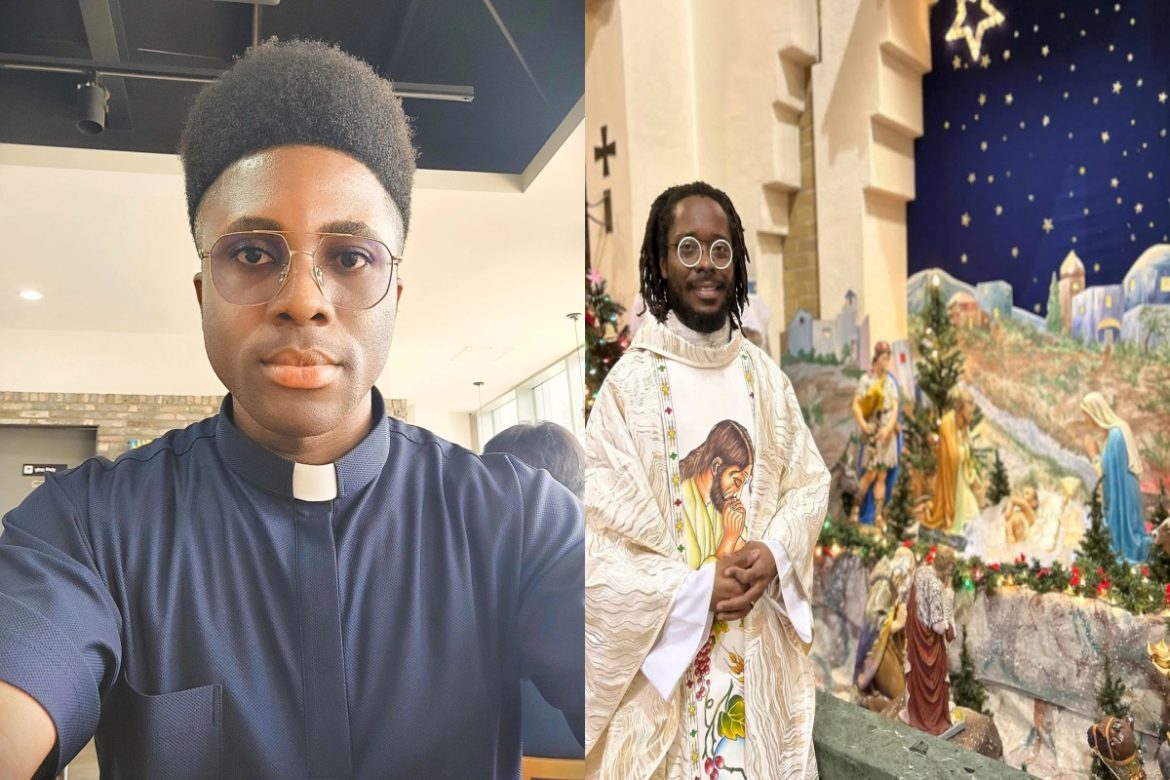A Nigerian Catholic missionary priest serving in China has ignited a global conversation on religious identity and post-colonial values after a social media post questioning the Church’s perception of African hairstyles went viral.
In the post, Rev. Fr. Prince Chidi Philip, a Roman Catholic priest, shared a striking image of another priest believed to be serving in Quebec, Canada celebrating Mass while wearing dreadlocks. But it was the question accompanying the image that captured attention:

“If I, a priest, wore dreadlocks, would you attend my Mass?”
The post, published earlier this week on Facebook, has since circulated widely across Christian communities, drawing comments from both clergy and laypersons, and sparking heated discussions about cultural authenticity, colonial influence, and spiritual prejudice.
“It Doesn’t Look Holy”
Fr. Philip’s reflection zeroes in on a persistent discomfort within African Christian spaces around hairstyles such as dreadlocks, often viewed as rebellious or unholy.

“Many would hesitate,” he wrote. “Some would walk out. Others might take to Facebook to ask if the Church has ‘fallen.’ But why?”
He challenges readers to unpack the source of this reaction: is it truly scriptural, or inherited from colonial-era Christianity, which often rejected indigenous African aesthetics in favor of Western norms?
“Ask an average Nigerian why dreadlocks are ‘bad,’” he noted. “They’ll likely say something vague like: ‘It’s not good. It doesn’t look holy.’”
In a bold comparison, Fr. Philip connects these attitudes to systemic profiling and abuse by law enforcement in Nigeria.
Referencing the now-defunct SARS (Special Anti-Robbery Squad), he wrote:

“This is the same dangerous mindset that powered SARS in Nigeria profiling young men with laptops, dreadlocks, tattoos, and piercings as criminals. It was never about crime. It was about control and cultural conformity.”
The implication is stark: that a hairstyle, far from being a matter of appearance, has become a cultural flashpoint where religion, power, and prejudice intersect.
The post has reignited ongoing critiques of how Christianity particularly in post-colonial Africa continues to reflect Western cultural standards as the default.
The core question raised is whether the Church in Africa has unconsciously adopted European markers of holiness at the expense of African expressions of faith.
“Is the issue really about dreadlocks or about fear of people’s opinions?” Fr. Philip asked.
“Let’s rethink what it means to be holy in Africa. Have we confused Jesus’ commands with colonial hangovers?”
The post has drawn support from advocates of liturgical inculturation those who believe African traditions should find fuller expression in Catholic worship.
“Holiness is not a hairstyle,” one user wrote in response.
However, some more conservative commentators questioned whether dreadlocks are appropriate within the solemnity of the Catholic liturgy. Others wondered whether the priest in the image had received permission from his diocese.
Neither the priest in the photo—whose name has not been confirmed—nor the Archdiocese of Quebec has commented on the matter at the time of publication.

Fr. Philip’s post ends with an invitation, not a conclusion.
“Let’s talk and learn together,” he wrote.
As African societies continue to wrestle with the remnants of colonial history, this moment serves as a reminder of how even the smallest symbol, a strand of hair can reflect much deeper questions about identity, power, and what it truly means to be holy.


